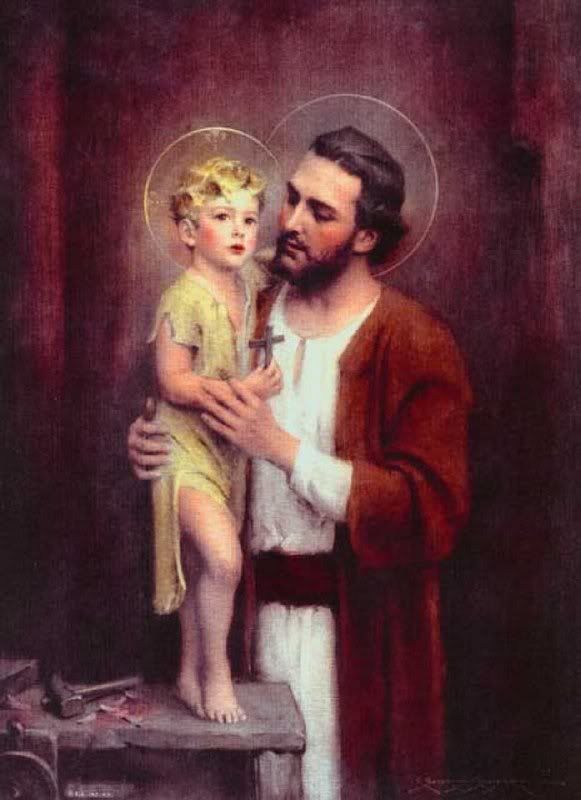Saturday, May 07, 2016
Daily Marian Prayer And Image

O compassionate Mother, most sacred Virgin, behold at thy feet the traitor, who, by paying with ingratitude the graces received from God through thy means, has betrayed both thee and him. But I must tell thee, O most blessed Lady, that my misery, far from taking away my confidence, increases it; for I see that thy compassion is great in proportion to the greatness of my misery. Show thyself, O Mary, full of liberality towards me: for thus thou art towards all who invoke thy aid.
All that I ask is that thou shouldst cast thine eyes of compassion on me, and pity me. If thy heart is thus far moved, it cannot do otherwise than protect me: and if thou protectest me, what can I fear? No, I fear nothing; I do not fear my sins, for thou canst provide a remedy; I do not fear devils, for thou art more powerful than the whole of hell; I do not even fear thy Son, though justly irritated against me, for at a word of thine he will be appeased.
I only fear lest, in my temptations, and by my own fault, I may cease to recommend myself to thee, and thus be lost. But I now promise thee that I will always have recourse to thee; O, help me to fulfill my promise. Lose not the opportunity which now presents itself of gratifying thy ardent desire to succor such poor wretches as myself. In thee, O Mother of God, I have unbounded confidence.
From thee I hope for grace to bewail my sins as I ought, and from thee I hope for strength never again to fall into them. If I am sick, thou, O heavenly physician, canst heal me. If my sins have weakened me, thy help will strengthen me. O Mary, I hope all from thee; for thou art all-powerful with God.
Amen.
Friday, May 06, 2016
Daily Marian Prayer And Image
From The Glories Of Mary, by Saint Alphonsus de Liguori:
O Mother of holy love, our life, our refuge, and our hope, thou well knowest that thy son Jesus Christ, not content with being himself our perpetual advocate with the eternal Father, has willed that thou also shouldst interest thyself with him, in order to obtain the divine mercies for us. He has decreed that thy prayers should aid our salvation, and has made them so efficacious that they obtain all that they ask. To thee therefore, who art the hope of the miserable, do I, a wretched sinner, turn my eyes.
I trust, O Lady, that in the first place through the merits of Jesus Christ, and then through thy intercession, I shall be saved. Of this I am certain; and my confidence in thee is such, that if my eternal salvation were in my own hands, I should place it in thine, for I rely more on thy mercy and protection than on all my own works.
My mother and my hope, abandon me not, though I deserve that thou shouldst do so. See my miseries, and, being moved thereby with compassion, help and save me. I own that I have too often closed my heart, by my sins, against the lights and helps that thou hast procured for me from the Lord. But thy compassion for the miserable, and thy power with God, far surpass the number and malice of my sins.
It is well known to all, both in heaven and on earth, that whosoever is protected by thee is certainly saved. All may forget me, provided only that thou dost remember me, O Mother of an omnipotent God. Tell him that I am thy servant; say onl that thou defendest me, and I shall be saved. O mary, I trust in thee; in this hope I live; in it I desire and hope to die, repeating always, "Jesus is my only hope, and after Jesus the most Blessed Virgin Mary" ("Unica spes mea Jesus et post Jesum Virgo Maria").
Amen.
Thursday, May 05, 2016
Daily Marian Prayer And Image
From The Glories Of Mary, by Saint Alphonsus de Liguori:
Behold, O Mother of my God, my only hope, Mary, behold at thy feet a miserable sinner, who asks thee for mercy. Thou art proclaimed and called by the whole Church, and by all the faithful, the refuge of sinners. Thou art consequently my refuge; thou hast to save me. I will say with William of Paris, Thou knowest, most sweet Mother of God, how much thy Blessed Son desires our salvation ("Tu . . . enim, dulcissima Dei Mater, nosti quantum placeat benedicto Filio tuo salus nostra"—Rhèt. Div. c. 18). Thou knowest all that Jesus Christ endured for this end. I present thee, O my Mother, the sufferings of Jesus: the cold that he endured in the stable, his journey into Egypt, his toils, his sweat, the blood that he shed, the anguish which caused his death on the cross, and of which thou wast thyself a witness. O, show that thou lovest thy beloved Son, and by this love I implore thee to assist me. Extend thy hand to a poor creature who has fallen, and asks thy help. Were I a saint, I would not need seek thy mercy: but because I am a sinner, I fly to thee, who art the Mother of Mercies. I know that thy compassionate heart finds its consolation in assisting the miserable, when thou canst do so, and dost not find them obstinate. Console, then, thy compassionate heart, and console me this day; for now thou hast the opportunity of saving a poor creature condemned to hell; and thou canst do so, for I will not be obstinate. I abandon myself into thy hands, only tell me what thou wouldst have me do, and obtain for me strength to execute it, for I am resolved to do all that depends on me to recover the divine grace. I take refuge under thy mantle. Jesus wills that I should have recourse to thee, in order not only that his blood may save me, but also that thy prayers may assist me in this great work; for thy glory, and for his own, since thou art his Mother. He sends me to thee, that thou mayst help me. O Mary, see, I have recourse to thee; in thee do I confide. Thou prayest for so many others, pray also for me; say only a word. Tell our Lord that thou willest my salvation, and God will certainly save me. Say that I am thine, and then I have obtained all that I ask, all that I desire.
Ascension Thursday

Happily, the Archdiocese of Boston adheres to the old rule, that the Ascension falls 40 days after Easter, on a Thursday. And even if it didn't, since I follow the 1962 Ordo (with some exceptions and additions) today would still be Ascension Thursday, a holy day of obligation.
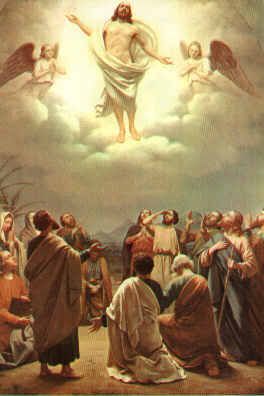
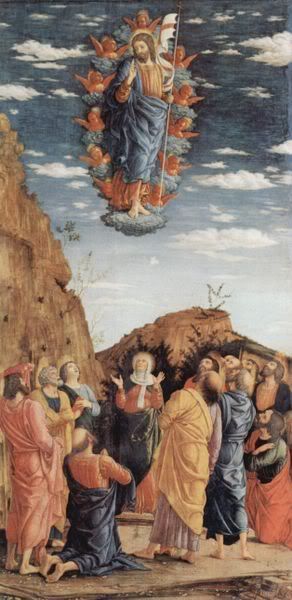
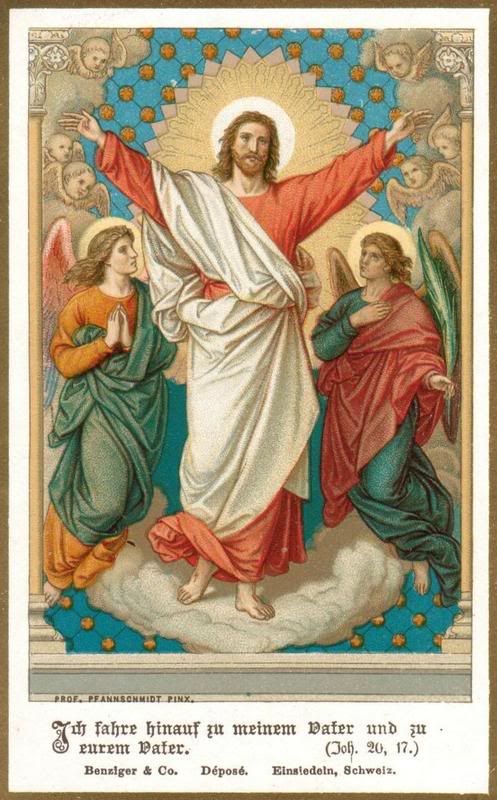
Wednesday, May 04, 2016
Daily Marian Prayer And Image

From The Glories Of Mary, by Saint Alphonsus de Liguori:
O my sovereign Queen and worthy Mother of my God, most holy Mary; I seeing myself, as I do, so despicable and loaded with so many sins, ought not to presume to call thee Mother, or even to approach thee; yet I will not allow my miseries to deprive me of the consolation and confidence that I feel in calling thee mother; I know well that I deserve that thou shouldst reject me; but I beseech thee to remember all that thy Son Jesus has endured for me, and then reject me if thou canst.
I am a wretched sinner, who, more than all others, have despised the infinite majesty of God: but the evil is done. To thee have I recourse; thou canst help me; my Mother, help me. Say not that thou canst not do so; for I know that thou art all-powerful, and that thou obtainest whatever thou desirest of God; and if thou sayest that thou wilt not help me, tell me at least to whom I can apply in this my so great misfortune. "Either pity me," will I say with the devout St. Anselm, "O my Jesus, and forgive me, and do thou pity me, my Mother Mary, by interceding for me, or at least tell me to whom I can have recourse, who is more compassionate, or in whom I can have greater confidence than in thee" ("Aut miseremini miseri, tu parcendo, tu interveniendo; aut ostendite, ad quos tutius fugiam misericordiores; et monstrate, in quibus certius confidam potentiores"—Orat. 50).
Amen.
Rogation Wednesday And the Vigil Of the Ascension
One of the glories of Catholicism is its ability to incorporate so many varying interests in aspects of our Catholic Faith under the same general rubric. Some Catholics are devoted to the Rosary, others to the Sacred Heart. Some especially revere Our Lady of Mount Carmel, others Our Sorrowful Mother. Some love the devotion of the Five Sacred Wounds, while others cling just as doggedly to the devotion of the Fifteen Os of Saint Bridget. Some are clients of this saint, some of that.
The Church's manner of accommodating so many varying interests has been to foster guilds devoted to these aspects of Catholic piety. The creation of a group of people devoted to a particular aspect of the Faith allows like-minded folks to interact, but at the same time keeps them within the bounds of our Mother the Church. The Church, in the modern parlance, is a "Big Tent." So long as you adhere to the Magesterium in matters of faith and morals, and live within the Church and its teachings, no one is going to make a fuss if you prefer to pray to St. Michael as the escort of souls, or to St. Joseph as the patron of a happy death, or to the general patronage of Our Blessed Lady, when you pray for a happy and holy death.
Guilds for a particular devotion have a long history, and were present in England before the protestant rebellion. They thrived in the 19th century, and were still going strong before the post-Vatican II tidal wave nearly wrecked everything. I believe, though I don't have any evidence to support this at the moment, that they are making a quiet comeback today. Where the Church is healthy, you will still find active St. Vincent de Paul Societies, and busy Holy Name Societies. The Spanish Penitents i profiled during Holy Week are modern devotional guilds.
As I said, the devotional guilds were a part of Catholic life well before the 1500s. And of course, as the parish community processed on important feast days, like the Rogation Days, the guilds took part. The processed together as a group (and one can imagine that the parish priest had to diplomatically allot the guilds' respective places in the procession).
Each group had some sort of banner. Often these banners were ephemeral, like the felt things one sees in churches today. But sometimes they were crafted symbols of the guild.
I have only found one image of surviving guild banners for procession. They are from France, and probably do not predate the French Revolution.
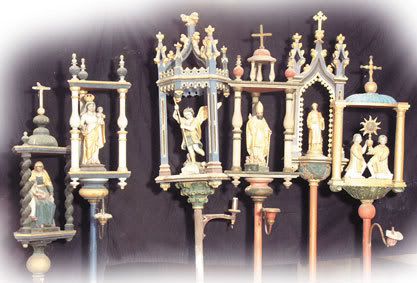
But one can see a Catholic community dividing itself into its "little platoons" and processing behind the Crucifix and the parish priest in small groups as they perambulate the parish, asking blessing on the crops, praying the Litany of the Saints, and beating the bounds of the parish.
The Church's manner of accommodating so many varying interests has been to foster guilds devoted to these aspects of Catholic piety. The creation of a group of people devoted to a particular aspect of the Faith allows like-minded folks to interact, but at the same time keeps them within the bounds of our Mother the Church. The Church, in the modern parlance, is a "Big Tent." So long as you adhere to the Magesterium in matters of faith and morals, and live within the Church and its teachings, no one is going to make a fuss if you prefer to pray to St. Michael as the escort of souls, or to St. Joseph as the patron of a happy death, or to the general patronage of Our Blessed Lady, when you pray for a happy and holy death.
Guilds for a particular devotion have a long history, and were present in England before the protestant rebellion. They thrived in the 19th century, and were still going strong before the post-Vatican II tidal wave nearly wrecked everything. I believe, though I don't have any evidence to support this at the moment, that they are making a quiet comeback today. Where the Church is healthy, you will still find active St. Vincent de Paul Societies, and busy Holy Name Societies. The Spanish Penitents i profiled during Holy Week are modern devotional guilds.
As I said, the devotional guilds were a part of Catholic life well before the 1500s. And of course, as the parish community processed on important feast days, like the Rogation Days, the guilds took part. The processed together as a group (and one can imagine that the parish priest had to diplomatically allot the guilds' respective places in the procession).
Each group had some sort of banner. Often these banners were ephemeral, like the felt things one sees in churches today. But sometimes they were crafted symbols of the guild.
I have only found one image of surviving guild banners for procession. They are from France, and probably do not predate the French Revolution.

But one can see a Catholic community dividing itself into its "little platoons" and processing behind the Crucifix and the parish priest in small groups as they perambulate the parish, asking blessing on the crops, praying the Litany of the Saints, and beating the bounds of the parish.
Tuesday, May 03, 2016
Daily Marian Prayer And Image

From The Glories Of Mary, by Saint Alphonsus de Liguori:
O Lady, O ravished of hearts! ("O Domina, quae rapis corda.") I will exclaim with St. Bonaventure: "Lady, who with the love and favor thou showest thy servants dost ravish their hearts, ravish also my miserable heart, which desires ardently to love thee. Thou, my Mother, hast enamoured a God with thy beauty, and drawn him from heaven into thy chaste womb; and shall I live without loving thee? "No, I will say to thee with one of thy most loving sons, John Berchmans of the Society of Jesus, I will never rest until I am certain of having obtained thy love; but a constant and tender love towards thee, my Mother, who hast loved me with so much tenderness" ("Nunquam quiescam, donec habuero tenerum amorem erga Matrem meam, Mariam"), even when I was ungrateful towards thee.
And what should I now be, O Mary, if thou hadst not obtained so many mercies for me? Since, then, thou didst love me so much when I loved thee not, how much more may I not now hope from thee, now that I love thee? I love thee, O my Mother, and I would that I had a heart to love thee in place of all those unfortunate creatures who love thee not. I would that I could speak with a thousand tongues, that all might know thy greatness, thy holiness, thy mercy, and the love with which thou lovest all who love thee. Had I riches, I would employ them all for thy honor. Had I subjects, I would make them all thy lovers. In fine, if the occasion presented itself I would lay down my life for thy glory. I love thee, then, O my Mother; but at the same time I fear that I do not love thee as I ought; for I hear that love makes lovers like the person loved. If, then, I see myself so unlike thee, it is a mark that I do not love thee. Thou art so pure, and I defiled with many sins; thou so humble, and I so proud; thou so holy, and I so wicked. This, then, is what thou hast to do, O Mary; since thou lovest me, make me like thee. Thou hast all power to change hearts; take, then, mine and change it. Show the world what thou canst, do for those who love thee. Make me a saint; make me thy worthy child. This is my hope.
Amen.
Rogation Tuesday
Since Rogationtide processions went on during all three days before Ascension Thursday, and there is a practical limit to how many times the congregation can chant the Litanies, and participate in the various prayers offered for newly-planted crops, something else needed to be added to occupy those in the procession. And that is the beating of the bounds.
As time went by, with parish and property lines often marked by natural features like a protuberant stone, those boundary lines often became blurred and shifted, either through natural events (a stream drying up or shifting) or human action (moving a stone to move the property line). A parish might want to exclude a home from its territory if the inhabitants were poor and shiftless and likely to become a charge on the charity of the parish. Or it might want to include more affluent homes on the edge of the boundary.
So, over time, means were devised to create a living memory of just where the boundary line was, regardless of the natural features mentioned in any grants or deeds. What was devised was this. During one or more of the Rogation Processions, the young boys of the parish were brought along and enjoined to memorize the exact line of the boundary. The boys would be beaten with narrow sticks to ensure their proper memorization, and to chastise them if their memory was faulty. Thus, the "Beating of the Bounds."
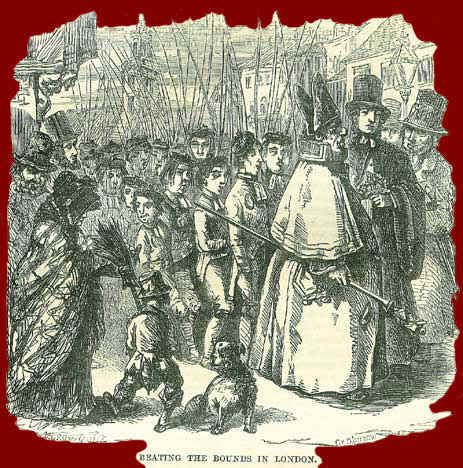
Today, when a "Beating of the Bounds" occurs, it tends to be in England, and to be a High Church Anglican thing. They have the old territorial parishes and the parish churches, since the protestant rebellion. English Catholics today, having less official status and being more scattered, take little interest in such local displays. Also today, it appears that New Age pagans like to attach themselves to Beating of the Bounds processions during Rogationtide, since it is a seasonal fancy-dress occasion. And they are joined by morris dancers, town criers, handbell guilds, and so on.
But the origins of the procession and the beating of the bounds are firmly Catholic. Perhaps someday, the vehicle of the Rogation Procession will be reunited to the Catholic practice that gave rise to it.
As time went by, with parish and property lines often marked by natural features like a protuberant stone, those boundary lines often became blurred and shifted, either through natural events (a stream drying up or shifting) or human action (moving a stone to move the property line). A parish might want to exclude a home from its territory if the inhabitants were poor and shiftless and likely to become a charge on the charity of the parish. Or it might want to include more affluent homes on the edge of the boundary.
So, over time, means were devised to create a living memory of just where the boundary line was, regardless of the natural features mentioned in any grants or deeds. What was devised was this. During one or more of the Rogation Processions, the young boys of the parish were brought along and enjoined to memorize the exact line of the boundary. The boys would be beaten with narrow sticks to ensure their proper memorization, and to chastise them if their memory was faulty. Thus, the "Beating of the Bounds."

Today, when a "Beating of the Bounds" occurs, it tends to be in England, and to be a High Church Anglican thing. They have the old territorial parishes and the parish churches, since the protestant rebellion. English Catholics today, having less official status and being more scattered, take little interest in such local displays. Also today, it appears that New Age pagans like to attach themselves to Beating of the Bounds processions during Rogationtide, since it is a seasonal fancy-dress occasion. And they are joined by morris dancers, town criers, handbell guilds, and so on.
But the origins of the procession and the beating of the bounds are firmly Catholic. Perhaps someday, the vehicle of the Rogation Procession will be reunited to the Catholic practice that gave rise to it.
Monday, May 02, 2016
Daily Marian Prayer And Image

From The Glories Of Mary, by Saint Alphonsus de Liguori:
O most holy Mother Mary, how is it possible that I, having so holy a mother, should be so wicked? a mother all burning with the love of God, and I loving creatures; a mother so rich in virtue, and I so poor? Ah, amiable Mother, it is true that I do not deserve any longer to be thy son, for by my wicked life I have rendered myself unworthy of so great an honor. I am satisfied that thou shouldst accept me for thy servant; and in order to be admitted amongst the vilest of them, I am ready to renounce all the kingdoms of the world. Yes, I am satisfied. But still thou must not forbid me to call thee mother. This name consoles and fills me with tenderness, and reminds me of my obligation to love thee. This name excites me to great confidence in thee. When my sins and the divine justice fill me most with consternation, I am all consoled at the thought that thou art my mother. Allow me then, to call thee mother, my most amiable mother. Thus do I call thee, and thus will I always call thee. Thou, after God, must be my hope, my refuge, my love in this valley of tears. Thus do I hope to die, breathing forth my soul into thy holy hands, and saying, My Mother my Mother Mary, help me, have pity on me!
Amen.
Rogation Monday
From a University of Chicago site:
The Rogation Days are three (or four) days focused on agriculture and nature, where we pray for a good harvest, fruitful crops, good weather, and protection from flood, tornado, earthquake, and other natural disasters. Traditionally the Church offers these requests on the Monday, Tuesday, and Wednesday before the Feast of the Ascension, although some churches also add the Sunday before Ascension, before Rogation Monday. (The Catholic Church marks April 25 as the Major Rogation, and the days before Ascension as the Minor Rogation.)
Rogation comes from the Latin rogatio and French rogare, meaning "to ask." Fifth-century France was beset with a number of natural disasters, including floods, failing harvests, and an earthquake on Ascension (which always falls on a Thursday). In response to these calamities Mamertus, Bishop of Vienne, called for three days of prayer, fasting, and repentance, and this quickly became the custom for the three days preceding Ascension.
The observance of Rogation Days spread throughout Europe (In England, the days are also known as Gang-Days, Gang-Week, or Cross-Week.) Many churches led a procession around the town or parish boundaries on one of the Rogation Days, chanting a litany to the saints and offering prayers for a good year. This practice became known as "beating the bounds." George Herbert recommends this practice in A Country Parson (see chapter 25).
Many churches in farming communities continue to observe a traditional Rogation.Other churches are adapting the Rogation services to a technology-based society.
Read more about Rogation Days here, here, here, and here.
Sunday, May 01, 2016
Sunday In Rogationtide, the Fifth Sunday After Easter
From The Liturgical Year, by Abbot Prosper Gueranger, OSB:
In the Greek Church, the fifth Sunday after Easter is called the Sunday of the man born blind, because her Gospel for the day contains the history of that miracle of our divine Lord. She also calls it Episozomene, which is one of the names given by the Greeks to the mystery of the Ascension, the feast of which is kept with them, as with us, during the course of this week.
The holy apostle, whose instructions these are, had received them from our risen Jesus: hence the authoritative tone wherewith he speaks. Our Saviour, as we have already seen, honoured him with a special visit. This proves that he was particularly dear to his divine master, to whom he was related by the tie of consanguinity on his mother's side, whose name was Mary. This holy woman went on Easter morning to the sepulchre, in company with her sister Salome, and Magdalene. St. James the Less is indeed the apostle of Paschal Time, wherein everything speaks to us of the new life we should lead with our risen Lord. He is the apostle of good works, for it is from him that we have received this fundamental maxim of Christianity, that though faith be the first essential of a Christian, yet without works it is a dead faith, and will not save us.
He also lays great stress on our being attentive to the truths we have been taught, and on our guarding against that culpable forgetfulness, which plays such havoc with thoughtless souls. Many of those who have this year received the grace of the Easter mystery, will not persevere; and, the reason is, that they will allow the world to take up all their time and thoughts, whereas they should use the world as though they did not use it. [I Cor. vii. 31.] Let us never forget, that we must now walk in newness of life, in imitation of our risen Jesus, who dieth now no more.
The two Alleluia-versicles celebrate the glory of the Resurrection; but they also contain an allusion to the approaching Ascension. Jesus was born eternally from the Father; He came down to us; but now, in a few days, He is to return to his Father.
When, at His last Supper, our Saviour thus warned His apostles of His having soon to leave them, they were far from knowing Him thoroughly. True, they know that He came forth from God; but their faith was weak, and they soon lost it. Now that they are enjoying His company after His Resurrection, now that they have received such light from His instructions, they know Him better. He no longer speaks to them in proverbs; He teaches them everything they require to know in order to become the teachers of the whole world. It is now they might truly say to Him: We believe that thou camest forth from God! So much the more, then, do they understand what they are going to lose by His leaving them.
Our Lord begins now to reap the fruit of the word He has sown in their hearts: oh! how patiently has He waited for it! If He praised them for their faith, when they were with Him on the night of the last Supper, He may surely do so now that they have seen Him in the splendour of His Resurrection, and have been receiving such teaching from His lips. He said to them, at the last Supper: The Father loveth you, because ye have loved Me; how much more must the Father love them now, when their love for Jesus is so much increased! Let us be consoled by these words. Before Easter our love of Jesus was weak, and we were tepid in His service; but now that we have been enlightened and nourished by His mysteries, we may well hope that the Father loves us, for we love Jesus better than we did before. This dear Redeemer urges us to ask the Father, in His name, for everything we need. Our first want is perseverance in the spirit of Eastertide; let it be our most earnest prayer; let it be our intention now that we are assisting at the holy sacrifice, which is soon to bring Jesus upon our altar.
The Offertory is taken from the Psalms; it is an act of thanksgiving which the Christian, united with his risen Jesus, offers to God for having brought him to the new life, and made him the object of His choicest graces.
In the Greek Church, the fifth Sunday after Easter is called the Sunday of the man born blind, because her Gospel for the day contains the history of that miracle of our divine Lord. She also calls it Episozomene, which is one of the names given by the Greeks to the mystery of the Ascension, the feast of which is kept with them, as with us, during the course of this week.
The holy apostle, whose instructions these are, had received them from our risen Jesus: hence the authoritative tone wherewith he speaks. Our Saviour, as we have already seen, honoured him with a special visit. This proves that he was particularly dear to his divine master, to whom he was related by the tie of consanguinity on his mother's side, whose name was Mary. This holy woman went on Easter morning to the sepulchre, in company with her sister Salome, and Magdalene. St. James the Less is indeed the apostle of Paschal Time, wherein everything speaks to us of the new life we should lead with our risen Lord. He is the apostle of good works, for it is from him that we have received this fundamental maxim of Christianity, that though faith be the first essential of a Christian, yet without works it is a dead faith, and will not save us.
He also lays great stress on our being attentive to the truths we have been taught, and on our guarding against that culpable forgetfulness, which plays such havoc with thoughtless souls. Many of those who have this year received the grace of the Easter mystery, will not persevere; and, the reason is, that they will allow the world to take up all their time and thoughts, whereas they should use the world as though they did not use it. [I Cor. vii. 31.] Let us never forget, that we must now walk in newness of life, in imitation of our risen Jesus, who dieth now no more.
The two Alleluia-versicles celebrate the glory of the Resurrection; but they also contain an allusion to the approaching Ascension. Jesus was born eternally from the Father; He came down to us; but now, in a few days, He is to return to his Father.
When, at His last Supper, our Saviour thus warned His apostles of His having soon to leave them, they were far from knowing Him thoroughly. True, they know that He came forth from God; but their faith was weak, and they soon lost it. Now that they are enjoying His company after His Resurrection, now that they have received such light from His instructions, they know Him better. He no longer speaks to them in proverbs; He teaches them everything they require to know in order to become the teachers of the whole world. It is now they might truly say to Him: We believe that thou camest forth from God! So much the more, then, do they understand what they are going to lose by His leaving them.
Our Lord begins now to reap the fruit of the word He has sown in their hearts: oh! how patiently has He waited for it! If He praised them for their faith, when they were with Him on the night of the last Supper, He may surely do so now that they have seen Him in the splendour of His Resurrection, and have been receiving such teaching from His lips. He said to them, at the last Supper: The Father loveth you, because ye have loved Me; how much more must the Father love them now, when their love for Jesus is so much increased! Let us be consoled by these words. Before Easter our love of Jesus was weak, and we were tepid in His service; but now that we have been enlightened and nourished by His mysteries, we may well hope that the Father loves us, for we love Jesus better than we did before. This dear Redeemer urges us to ask the Father, in His name, for everything we need. Our first want is perseverance in the spirit of Eastertide; let it be our most earnest prayer; let it be our intention now that we are assisting at the holy sacrifice, which is soon to bring Jesus upon our altar.
The Offertory is taken from the Psalms; it is an act of thanksgiving which the Christian, united with his risen Jesus, offers to God for having brought him to the new life, and made him the object of His choicest graces.
Daily Marian Prayer And Image
From The Glories Of Mary, by Saint Alphonsus de Liguori:
O, Mother of my God, and my Lady Mary; as a beggar, all wounded and sore, presents himself before a great queen, so do I present myself before thee, who art the Queen of heaven and earth. From the lofty throne on which thou sittest, disdain not, I implore thee, to cast thine eyes on me, a poor sinner. God has made thee so rich that thou mightest assist the poor, and has constituted thee Queen of Mercy in order that thou mightest relieve the miserable. Behold me then, and pity me: behold me and abandon me not, until thou seest me changed from a sinner into a saint. I know well that I merit nothing; nay more, that I deserve, on account of my ingratitude, to be deprived of the graces that, through thy means, I have already received from God. But thou, who art the Queen of Mercy, seekest not merits, but miseries, in order to help the needy. But who is more needy than I?
O, exalted Virgin, well do I know that thou, who art Queen of the universe, art already my queen; yet am I determined to dedicate myself more especially to thy service, in order that thou mayest dispose of me as thou pleasest. Therefore do I address thee in the words of St. Bonaventur: "Do thou govern me, O my Queen, and leave me not to myself" ("Domina, me tuae dominationi committo, ut me plenarie regas et gubernes; no mihi me relinquas."—Stim. Div. Am. p. 3, c. 19). Command me; employ me as thou wilt, and chastise me when I do not obey; for the chastisements that come from thy hands will be to me pledges of salvation. I would rather be thy servant than the ruler of the earth. I am thine; save me ("Tuus sum ego, salvum me fac."—Ps. cxviii. 94). Accept me, O Mary, for thine own, and as thine, take charge of my salvation. I will no longer be mine; to thee do I give myself. If, during the time past I have served thee ill, and lost so many occasions of honoring thee, for the future I will be one of thy most loving and faithful servants. I am determined that from this day forward no one shall surpass me in honoring and loving thee, my most amiable Queen. This I promise; and this, with thy help, I hope to execute.
Amen.




